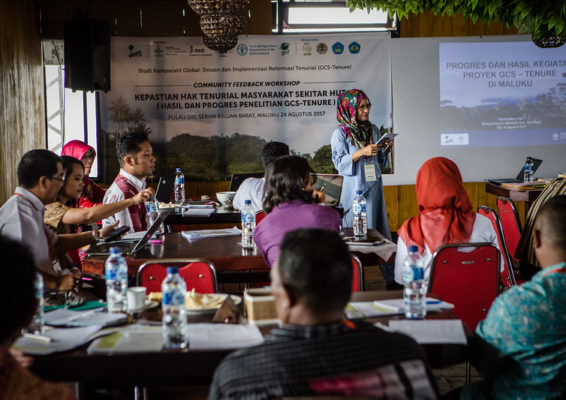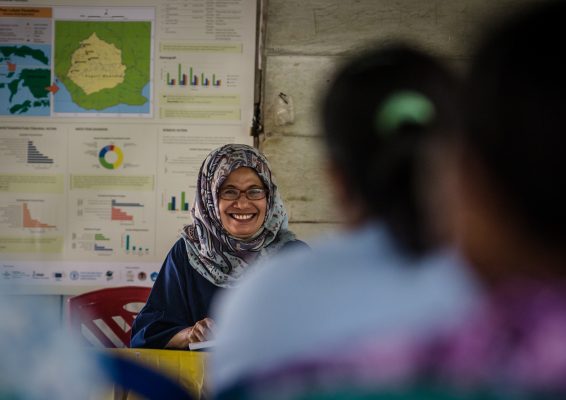
Nining Liswanti is a researcher with CIFOR-ICRAF Indonesia. She has an undergraduate degree in forestry from the University of Gajah Mada and a master’s degree on Environment and Natural Resource Management from Bogor Agriculture Institute. She has worked on a wide range of research activities including biodiversity assessment, multidisciplinary landscape assessment, land use planning, forest and land tenure, Trees on Farms (TonF), multistakeholder processes, and gender and climate change, and is currently researching REDD+ safeguards for Indigenous Peoples and local communities in Indonesia. She has experience working with diverse stakeholders from local to national level across Indonesia’s forestry sector.
Q: Why did you become a scientist? What motivates you in your work?
A: I like working with nature and people, in particular local communities in and around the forest (including women and ethnic minority groups); I like traveling; I like to have new opportunities and experiences. And I could get all of this when I started working at CIFOR, by doing different kind of research activities, both biophysical and social science, on different islands across Indonesia. In addition, Indonesia’s tropical forests consist of high biodiversity richness, as well as diversity in culture and indigenous ethnic groups. This has become my motivation: to learn something new and – if we can – to contribute to direct and indirect benefits for local communities in this country.
Q: Can you share an example of a barrier you overcame to become a scientist? What about an opportunity (situation or person) that pulled you forward in your career?
A: Currently I think that women and men have the same opportunities and challenges in science. I have been lucky to work with great scientists at CIFOR who gave me opportunities to improve my knowledge and skills with their support. If we want to try and learn to do something new, doors to careers will open. However, working in remote forest areas can be quite challenging for women, who often cannot be as free as men when doing activities with communities. They may also be quite dependent on men – especially in villages with no electricity or facilities, as walking alone during the night wasn’t an easy thing for a woman. Sometimes, if my son or daughter got sick while I was in the field, as a mother I felt worried because I was far away from home.


Q: What does it mean to you to be a woman in science?
A: I am proud to be a woman who contributes to science, because this proves that women can progress if we want to. At CIFOR-ICRAF for example, there is a significant number of women in science. I have worked with several women researchers who demonstrate patience, thoroughness, creativity and innovation – as well as the persistence needed to complete the work.
Q: Why is it important to have women leading in science?
A: In Indonesia nowadays there are many leading women who occupy top positions, both in government and non-governmental sectors. This is because when women become leaders it is very beneficial for the organisation, as they can see from sides that are not visible. In addition, the number of women in Indonesia who are seizing opportunities to work in science is increasing over time. This phenomenon is now quite common across Indonesia, and I think it will have a positive impact. Happy International Women’s Day!
______
Read more about Nining Liswanti’s work:
Trust-building in a multistakeholder forum in Jambi, Indonesia
Tenure reform and perceived food security in Indonesia: An exploratory study
Falling back on forests: how forest-dwelling people cope with catastrophe in a changing landscape
______
This is the fourth in a series of Q&As with women scientists at the Center for International Forestry Research and World Agroforestry (CIFOR-ICRAF). Ahead of the International Day of Women and Girls in Science (11 February), we asked them what motivates them, any barriers they overcame, what it means to them to be a woman in science, and why it’s important for women to have equitable positions and adequate representation in the sector. Read the Q&As with bioenergy scientist Mary Njenga, food and nutrition scientist Mulia Nurhasan, and post-doctorate research fellow Eponle Usoh Sylvie.
For more information on Nining Liswanti’s work, please contact her at N.Liswanti@cifor-icraf.org
For more information about CIFOR-ICRAF’s work on gender equality and social inclusion (GESI), please contact Elisabeth Leigh Perkins Garner (e.garner@cifor-icraf.org) or Anne Larson (a.larson@cifor-icraf.org).
We want you to share Forests News content, which is licensed under Creative Commons Attribution-NonCommercial-ShareAlike 4.0 International (CC BY-NC-SA 4.0). This means you are free to redistribute our material for non-commercial purposes. All we ask is that you give Forests News appropriate credit and link to the original Forests News content, indicate if changes were made, and distribute your contributions under the same Creative Commons license. You must notify Forests News if you repost, reprint or reuse our materials by contacting forestsnews@cifor-icraf.org.